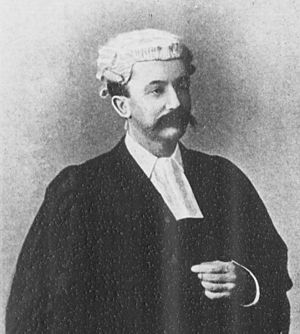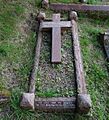Frederic Weatherly facts for kids
Frederic Edward Weatherly (born October 4, 1848 – died September 7, 1929) was a talented English lawyer, writer, and songwriter. He wrote the words for many popular songs, including the famous "Danny Boy" and "The Holy City". People believe he wrote lyrics for at least 3,000 songs during his life.
Contents
Early Life and Education
Frederic Weatherly was born in Portishead, Somerset, England. He was the oldest son in a large family. His father, also named Frederick, was a doctor.
Frederic went to Hereford Cathedral School from 1859 to 1867. After that, he earned a scholarship to Brasenose College, Oxford in 1867. At Oxford, one of his teachers, Walter Pater, taught him about Italian art. Frederic tried three times to win a poetry prize called the Newdigate Prize, but he didn't win.
In 1868, Frederic helped his college's rowing team in a special way. The team needed a cox (the person who steers the boat) for a race. Frederic volunteered to start the race with them and then quickly jump out of the boat. He did this, and the team won! However, they were disqualified because of his unusual move. This event later helped change the rules for that race to allow boats without a cox.
Frederic finished his studies in Classics in 1871. In 1872, he married Anna Maria Hardwick, also known as "Minnie." They had a son and two daughters.
Career as a Lawyer and Writer
After college, Frederic first worked as a schoolteacher and then as a private tutor in Oxford. In 1887, he became a barrister, which is a type of lawyer who argues cases in court. He practiced law in London and later in the west of England.
Frederic was very busy with both his law career and his writing. The Times newspaper once said that he created an amazing amount of work. They noted that no other lawyer had brought so much "innocent pleasure" through their writing.
In 1919, Frederic celebrated 50 years as a songwriter. Publishers and composers he had worked with held a special dinner for him. In his later years, he was also popular as a speaker on radio and at events.
In 1926, Frederic was given the title of King's Counsel, which is a very senior position for a barrister. That same year, he wrote a book about his life called Piano and Gown.
Frederic Weatherly passed away on September 7, 1929, at the age of 80, in Bath. At his funeral, the famous tune "Londonderry Air" was played, which is the music for his well-known song "Danny Boy." He was buried at Smallcombe Cemetery in Bath.
Famous Songs and Other Works
Frederic Weatherly wrote many popular songs. Here are some of his most famous ones:
The Holy City
One of Frederic's earliest well-known songs was the hymn "The Holy City." He wrote the words in 1892, and it was set to music by Stephen Adams. The song is famous for its chorus, "Jerusalem, Jerusalem!"
Danny Boy
Frederic wrote the lyrics for "Danny Boy" in 1910 while living in Bath. At first, the song wasn't very successful. But in 1912, his sister-in-law in America sent him an old Irish tune called "Londonderry Air." Frederic had never heard it before. The beautiful tune fit his "Danny Boy" lyrics almost perfectly! He published the song with this new music in 1913, and it became incredibly famous.
Roses of Picardy
During World War I, Frederic wrote another very popular song called "Roses of Picardy." It was written in 1916 and had music by Haydn Wood. This song became one of the most beloved songs from the war.
Other Works
Frederic wrote many other songs, including "Nancy Lee," "The Old Brigade," and "Darby and Joan." He also wrote books, such as Wilton School (1872) and books about logic and copyright law. He even published several collections of his poems.
Frederic also worked in opera. He translated the words for famous operas like Pagliacci and Cavalleria rusticana into English for the Covent Garden in London. He also wrote the lyrics for an opera called Mirette in 1894.
Images for kids
 | Chris Smalls |
 | Fred Hampton |
 | Ralph Abernathy |




